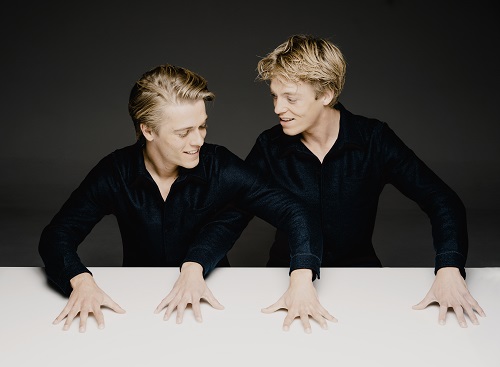 Switzerland Enescu, Bartók, Dvořák: Lucas Jussen and Arthur Jussen (piano), Christian Hartmann (timpani), Andreas Berger and Klaus Schwärzler (percussion). Tonhalle Orchestra Zurich / Cristian Măcelaru (conductor). Tonhalle, Zurich, 6.10.2022. (JR)
Switzerland Enescu, Bartók, Dvořák: Lucas Jussen and Arthur Jussen (piano), Christian Hartmann (timpani), Andreas Berger and Klaus Schwärzler (percussion). Tonhalle Orchestra Zurich / Cristian Măcelaru (conductor). Tonhalle, Zurich, 6.10.2022. (JR)

Enescu – Romanian Rhapsody No.1
Bartók – Concerto for two pianos, percussion and orchestra, Sz 115
Dvořák – Symphony No.8, Op.88
Few music lovers outside his native Romania know many of the works by George Enescu. He is perhaps best known for his Romanian Rhapsodies; these are early works, written in the composer’s early twenties, and remind one immediately of Dvořák’s Slavonic Dances. The Rhapsodies became Enescu’s most popular composition, rather to his chagrin, bitterly resenting the way they had dominated and narrowed his reputation as a composer; he had not really developed his own style by then. The work is based on a number of Romanian folk tunes, inspired by Hungarian melodies and instrumentation. Six songs and dances are quoted in the piece. Lyrical rustic scenes with woodwind to the fore are juxtaposed with fiery outbursts from the entire orchestra. It is a delightful piece, the frenetic whirlwind sections make it an enjoyable crowd-pleaser, even if it is somewhat of a trifle. Felix-Andreas Genner returned from recent retirement to play principal clarinet, with great distinction.

The Dutch Jussen brothers are still in their twenties and seem to have a following of adoring adolescents. They are slim, blond, nattily attired and ran on to and off the stage like excited schoolboys. They are full of energy but rather mannered in their style of playing. Distractingly, they bounced up and down like a couple of jack-in-the-boxes. The concerto for two pianos, percussion and orchestra is much less known than Bartók’s Music for Strings, Percussion and Celeste. The concerto suffers from a rather dull opening and soporific slow movement, redeemed only in the final movement, full of jaunty rhythmic intensity (played twice at the work’s première). Christian Hartmann, Klaus Schwärzler and Andreas Berger added their percussive contributions with aplomb. It remains to be seen whether either (or both) the Jussen brothers will go their own way to develop a solo career.
This was Cristian Măcelaru’s debut with the orchestra and he certainly made the grade, in music which is clearly in his blood. Măcelaru was guided in the early stages of his conducting career by former Tonhalle Orchestra Principal Conductor David Zinman; he stepped in for Pierre Boulez and the Chicago Symphony some ten years ago. Măcelaru is now Principal Conductor of the WDR (West German Radio) Symphony Orchestra and Musical Director of the Orchestre National de France. He is also Artistic Director of the George Enescu International Competition in Romania. While the stage was being re-arranged for the Bartók, Măcelaru grabbed the microphone and told us at length how folk music has enriched all our lives – I could have done without that.
Măcelaru guided the orchestra skilfully through Dvořák’s popular and uplifting Eighth Symphony. He never put a foot (or baton) wrong. I last heard the work under Gianandrea Noseda, who was a mite more fiery, whereas Măcelaru was more down to earth, often heavyweight. In the orchestra, the rasping trombones and horn section led by Mischa Greull caught attention, as did the golden flute of Sabine Poyé-Morel. I suspect Zurich will see and hear more of Măcelaru in future.
John Rhodes